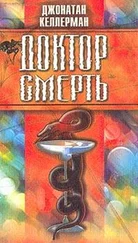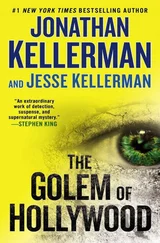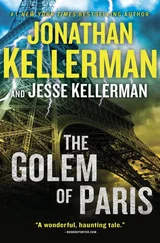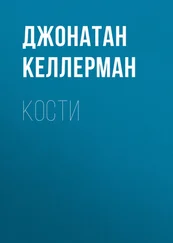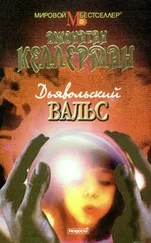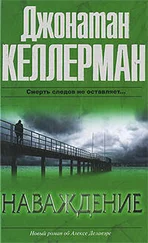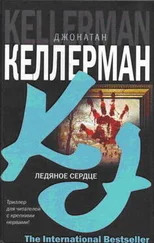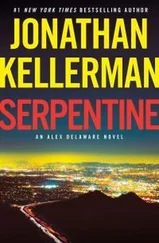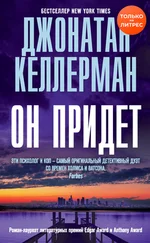Midway through the brochure I found a shot of McCaffrey in a room I recognized as the lecture hall at Western Pediatric. Next to him, white hair gleaming, was Towle. On the other side was a small man, froggy, squat, grim even as he smiled. The guy with Peter Lorre eyes whose photograph I’d seen in Towle’s office. The caption beneath the photo identified him as the Honorable Edwin G. Hayden, supervising judge of the Dependency Court. The occasion was McCaffrey’s address to the medical staff on “Child Welfare: Past, Present and Future.”
“Is Dr. Towle very involved in La Casa?” I asked.
“He serves on our board and is one of our rotating physicians. Do you know him?”
“We’ve met. Casually. I know him by reputation.”
“Yes, an authority on behavioral pediatrics. We find his services invaluable.”
“I’m sure you do.”
He spent the next quarter-hour showing me his book, a soft-covered, locally printed volume of saccharine cliches and first-rate graphics. I bought a copy, for fifteen bucks, after he gave me a more sophisticated version of the pitch for cash Kruger had thrown my way. The bargain basement ambience of the office lent credibility to the spiel. Besides, I was O.D.’ed on positive thinking and it seemed a small price to pay for respite.
He took the three five-dollar bills, folded them and placed them conspicuously in a collection box atop the desk. The receptacle was papered with a drawing of a solemn-looking child with eyes that rivaled Melody Quinn’s in size, luminosity and the ability to project a sense of inner hurt.
He stood, thanked me for coming, and took my hand in both of his. “I hope we see more of you, Doctor. Soon.”
It was my turn to smile.
“Plan on it, Reverend.”
Grandma was ready for me as I stepped into the waiting room, with a sheaf of stapled booklets and two sharpened number two pencils.
“You can fill these out right here, Doctor Delaware,” she said sweetly.
I looked at my watch.
“Gee, it’s much later than I thought. I’ll have to take a raincheck.”
“But–” She became flustered.
“How about you give them to me to take home? I’ll fill them out and mail them back to you.”
“Oh no, I couldn’t do that! These are psychological tests!” She clutched the papers to her breast. “The rules are that you must fill them out here.”
“Well, then, I’ll just have to come back.” I started to leave.
“Wait. Let me ask someone. I’ll ask Reverend Gus if it’s–”
“He told me he was going to retire for a period of meditation. I don’t think he wants to be disturbed.”
“Oh.” She was disoriented. “I must ask someone. You wait right here, Doctor, and I’ll find Tim.”
“Sure.”
When she was gone I slipped out the door, unnoticed.
The sun had almost set. It was that transitional time of day when the diurnal palette is slowly scraped dry, colors falling aside to reveal a wash of gray, that ambiguous segment of twilight when everything looks just a little bit fuzzy around the edges.
I walked toward my car unsettled. I’d spent three hours at La Casa and had learned little other than that the Reverend Augustus McCaffrey was a shrewd old boy with overactive charisma glands. He’d taken the time to check me out and wanted me to know it. But only a paranoiac could rightfully see anything ominous in that. He was showing off, displaying how well informed and prepared he was. The same went for his advertising the abundance of friends in high places. It was psychological muscle-flexing. Power respected power, strength gravitated to strength. The more connections McCaffrey could show, the more he was going to get. And that was the way to big bucks. That, and collection boxes illustrated with sad-eyed waifs.
I had the key in the door of the Seville, facing the campus of the institution. It looked empty and still, like a well-run farm after the work’s all done. Probably dinner time, with the kids in the cafeteria, the counselors watching, and the Reverend Gus delivering an eloquent benediction.
I felt foolish.
I was about to open the door when I caught a glimpse of a flurry of movement near the forest-like Grove, several hundred feet in the distance. It was hard to be certain, but I thought I saw a struggle, heard the sound of muffled cries.
I put the car keys back in my pocket and let the copy of McCaffrey’s book drop to the gravel. There was no one else in sight, except for the guard in the booth at the entrance and his attention was focused in the opposite direction. I needed to get closer without being seen. Carefully I made my way down the hill upon which the parking lot sat, staying in the shadow of buildings whenever I could. The shapes in the distance were moving, but slowly.
I pressed myself against the flamingo-pink wall of the southernmost dormitory, as far as I could go without abandoning cover. The ground was moist and mushy, the air rotten with fumes given off by a nearby trash dumpster. Someone had tried to write FUCK in the pink paint, but the corrugated metal was a hostile surface and it came out chicken scratches.
The sounds were clearer and louder now, and they were definitely cries of distress – animal cries, bleating and plaintive.
I made out three silhouettes, two large, one much smaller. The small one seemed to be walking on air.
I inched closer, peering around the corner. The three figures passed before me, perhaps thirty feet away moving along the southern border of the institution. They walked across the concrete of the pool deck and came under the illumination of a yellow anti-bug light affixed to the eave of the pool house
It was then that I saw them clearly, flash frozen in the lemon light.
The small figure was Rodney and he’d appeared suspended because he was being carried in the firm grip of Halstead, the coach, and Tim Kruger. They grasped him under the arms so that his feet dangled inches from the ground.
They were strong men but the boy was giving them a struggle. He squirmed and kicked like a ferret in a trap, opened his mouth and let out a wordless moan. Halstead clamped a hairy hand over the mouth but the child managed to wrench free and scream again. Halstead stifled him once more and it went on that way as they retreated out of the light and my line of vision, the alternating sounds of cries and muted grunts a crazy trumpet solo that grew faint then faded away.
Then it was silent and I was alone, back to the wall, bathed in sweat, clothes clammy and sticking to me. I wanted to perform some heroic act, to break out of the deadening inertia that had settled around my ankles like quick-drying cement.
But I couldn’t save anybody. I was a man out of his element. If I followed them there’d be rational explanations for everything and a herd of guards to quickly turn me out, taking careful note of my face so that the gates of La Casa would never again open before it.
I couldn’t afford that, just yet.
So I stood, up against the wall, rooted in the ghost-town stillness, feeling sick and helpless. I clenched my fists until they hurt and listened to the dry urgent sound of my own breathing like the scraping of boots against alley stones.
I forced the image of the struggling boy out of my mind.
When I was sure it was safe I sneaked back to my car.
The first time I called, at 8 a.m. nobody answered. A half-hour later the University of Oregon was open for business.
“Good morning, Education.”
“Good morning. This is Dr. Gene Adler calling from Los Angeles. I’m with the Department of Psychiatry at Western Pediatric Medical Center in Los Angeles. We’re currently recruiting for a counseling position. One of our applicants has listed on his resume the fact that he received a master’s degree in counseling education from your department. As part of our routine credentials check I was wondering if you could verify that for me.”
Читать дальше


